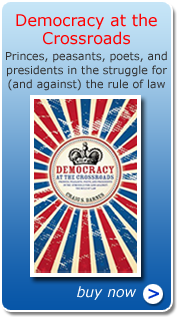The Pentagon has released a report detailing the growth of hostility and anger within the Islamic world against the United States. (In "the war of ideas or the struggle for hearts and minds" the report says, "American efforts have not only failed, they may also have achieved the opposite of what they intended. " Report of the Defense Science Board, quoted in The Sunday Herald, Dec. 5, 2004). The report says that the war in Iraq has increased rather than decreased the numbers of terrorists in Iraq and throughout the Islamic world and has failed to make the Middle East safer for democracy. The number of people in Islamic countries who support US foreign policy has been reduced to single digits.
The unintended consequence therefore of a militaristic foreign policy has been that stable governments upon which the United States has previously relied such as Egypt, Jordan, Pakistan, and Saudi Arabia have become islands in a sea of hatred against the United States. This in turn means that while these governments may be moderate in their policies that very moderation is alienating them from their own people. Islamic governments which appear to tolerate the U.S. are slowly losing popular support and becoming more and more vulnerable to revolt and revolution.
A majority of such governments have achieved their authority partly through tribal inheritance, partly through religious inheritance, partly through military oppression. These are weak foundations. In time, as Arabic populations see continuing TV reports showing more and more Iraqi civilians being shot, more and more mosques being destroyed those governments perceived as friendly to the U.S. are likely to become more and more unstable.
In Saudi Arabia again this week dissidents attacked an American consulate. The goal of the attack was in all probability the Saudi government itself which is both totally undemocratic and daily made politically weaker by its obvious economic interdependence with the United States. Islamic moderates and intellectuals who already express principled opposition to monarchy are now moved to new emotional support for the resistance by daily TV reports from the war. So long as the U.S. continues to destroy sacred Islamic sites and kill innocent civilians support for revolution among the population of Saudi Arabia will surely increase.
The greater danger to the U.S. lies in this: When the flames finally explode in one of these countries our government is apt to respond to the temptation to stabilize the collapsing regime with American troops. Mr. Bush is accustomed to say that military action is vital to American interests especially if oil is nearby. Islamists are apt to say, with equal if not greater reason, that the action is intended to expand American empire. More wars, in turn, are apt to require institution of a military draft at home. With troops still in Afghanistan and Iraq the burden of protecting Saudi princes, or a Jordanian king, or a Pakistani general is likely to become financially and politically unbearable.
An American regime that relies only upon its military—as this one does—rather than some foreign or diplomatic policy, or rather than enforcing international law and legal institutions, is likely to find additional excuse to take action against Iran or Syria, which we will then describe as terrorist regimes allied with terrorists in Saudi Arabia and Iraq and Afghanistan. One can now imagine the dominoes falling. One by one the invitation to use American power will draw us deeper and deeper into deserts and mountains farther and farther from home.
There is nothing new about this. In his famous study of 27 civilizations the British historian Arnold Toynbee discovered that the repeated pattern was an inability to resist military expansion. Once the appetite for battle is fostered at home, war on one frontier leads to another war just beyond to the next and the next. Supply lines get longer; the national treasury at home is gradually drained; those paying the bills begin to dissent; more and more young people are pressed into the military; anger at home turns from quiet to ferocious; the military turns from abroad to come home to stabilize the domestic situation; civil liberties are extinguished; the instinct for civilization gradually unravels. At the beginning, all those expansive and vainglorious military decisions seemed so natural. But that is how civilizations naturally decline. Once the military road is chosen it is like a dangerous narcotic and few be they who can resist.
